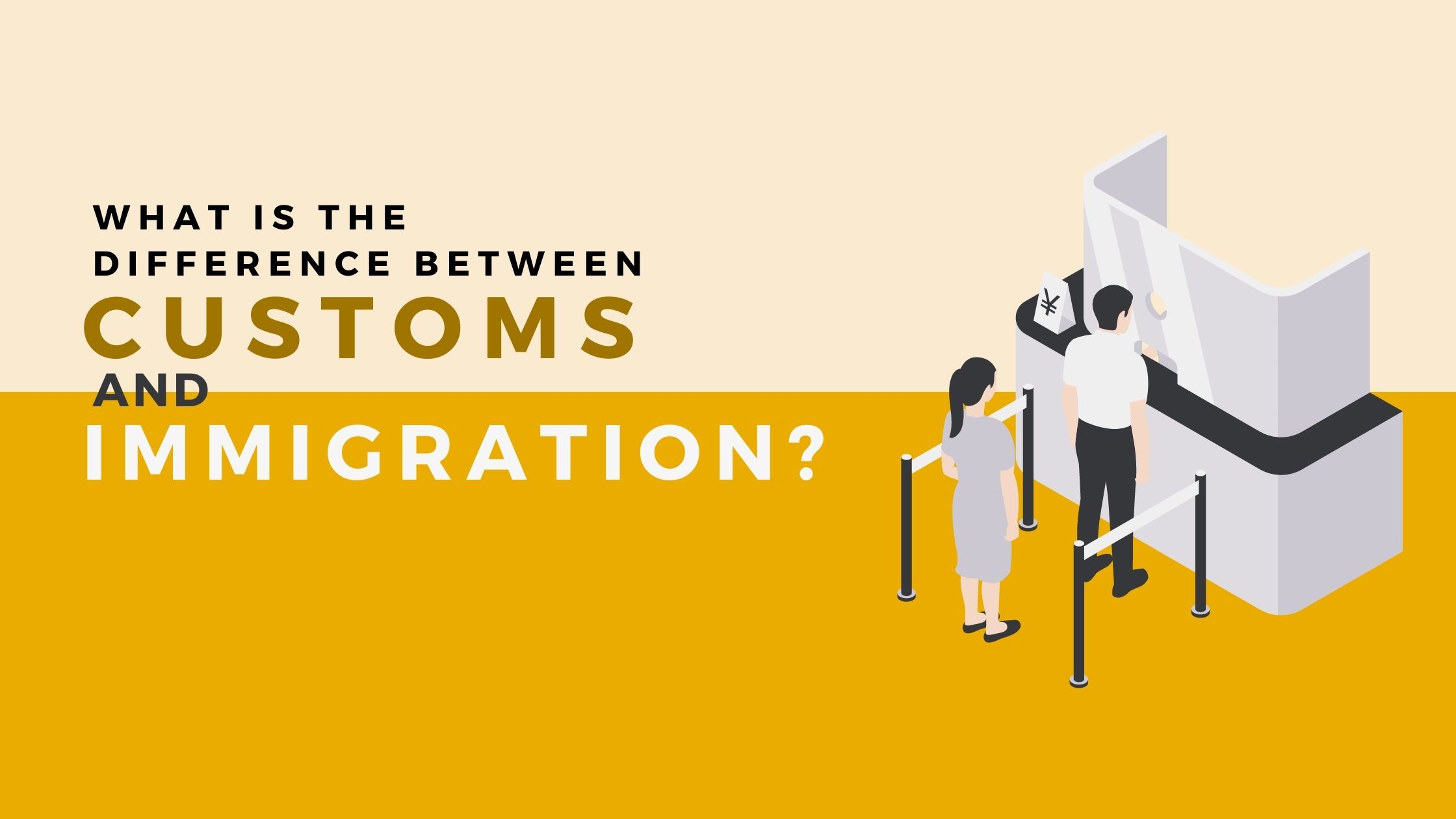On an international trip, you will pass through immigration and customs twice: once when you arrive in the foreign country you are visiting and once more when you return from the foreign country. This blog walks you through how customs and immigration differ and what they entail.
What Is The Difference Between Customs And Immigration?
Immigration handles and has the power over which person or a group of people get to move from one nation to another, especially when flying. Customs is an agency that regulates not the person but the items that can and can not be brought within the country.
The term “immigration” refers to people who move from one nation to another. But, in context with the airport, immigration may also be referred to as “border control” or “passport control.” On the other hand, the items such people bring with them are the subject of “customs.”
International airports are the first point of entry into a new country. So, crossing international borders typically entails some sort of checkpoints, which travelers must pass through before departing the airport. These two are commonly called customs and immigration together.
Customs and immigration officers of a country inspect visitors to determine whether they are legally permitted to be in that country, have the proper documentation, and bring any contraband with them.
In many airports, customs is an optional process. In such airports, if you have nothing to declare, you don’t need to go through the process. However, immigration, which entails dealing with an immigration official who stamps your passport, is often required.
What Is Customs?

Credit: Photo by CDC on Unsplash
Customs is an organization or body that controls how items enter and leave a country. Moreover, customs is responsible for collecting taxes imposed on imported goods.
The country you visit will have its own laws and regulations covering the import and export of goods into and out of it. This is similar to the fact that each country has a body that streamlines the immigration process. The applicable customs agency is in charge of enforcing these rules.
What Is A Customs Declaration Form?
When moving certain items over international borders, the majority of countries require travelers to complete a customs declaration form. So, when a citizen or tourist enters a customs jurisdiction, a customs declaration is a form that outlines the specifics of the items that are being imported or exported.
Your flight attendant will hand out a Customs Declaration Form while your flight is in the air. Here is what it may look like.
Most custom declaration forms ask for your flight’s place of departure and arrival, flight number, and any possible importation of goods (forms might list prohibited items for the respective country).
Take care of the following points with regard to the customs declaration forms.
- While in flight, fill out the Customs Declaration form.
- If you have any questions, ask the flight attendant or your traveling companions.
- When traveling back to your home country, declare any restricted items you may have with you as well as any items you bought abroad.
- To a customs official, present your declaration form.
- Your luggage may or may not be inspected by customs agents. You can be required to pay duty and/or fines if they do inspect your bags and discover prohibited items. For this reason, it is crucial to declare goods as requested and necessary.
- Each country and airport have unique customs procedures, restrictions, and regulations for the declaration of goods. Therefore, before you fly, find out about the customs regulations of that country and the airport of entry.
What Are Customs Fees?
Customs duties or fees are effectively charged on the items you carry across international borders. Most items that vacationers or travelers bring back are for personal use. And usually, these items are brought in modest enough amounts that they won’t be charged.
In other instances, there is a point at which travelers are required to pay a price. Depending on how many items you bring with you, there may be a customs duty on items, such as alcohol and tobacco. You can find out about customs fees on various items here in detail.
What Is Immigration?
Immigration controls the international movement of people to a country of destination where they are not natives or citizens. You will need to go through immigration when you land in a nation other than the one your flight originated from.
Each country will have a separate organization in charge of overseeing the immigration inspection procedure. The great majority of people breeze through immigration in a matter of minutes. However, if several international flights arrive at the same time, queues may get longer.
How Do Customs And Immigration Work?

Credit: Photo by ConvertKit on Unsplash
If this is your first international trip, customs and immigration checks may be new to you. The flight attendants will usually offer you an arrival form and a customs declaration form to fill out before you land in a country. So, carry a pen with you.
You may be a student and have arrived in that country to study. If your accommodation hasn’t been assigned yet, you can use the international university address in place of an international address. This part can be challenging. So, take your time to review the documents and determine what you need to declare.
Here is how the entire customs and immigration process goes by.
- You’ll probably follow your fellow passengers to immigration once you’ve got off the plane. Otherwise, simply look out for signs that read “Immigration” or “Customs and Immigration.”
- There are several queues for the passengers. Among these, there are usually queues for non-immigrant tourists, citizens of EU, ECOWAS, etc., and nationals of the host country (individuals possessing a passport from that country).
To prevent confusion and time loss, make sure you enter the proper line.
- Once there, there will probably be a sizable queue that you must wait in. Pay attention to signs that state things like “visitors” or “non-nationals” so that you can be in the correct queue. If you aren’t a citizen of the host country, you’ll probably go via the non-immigrant guest queue when passing through immigration.
- Take your passport out of any protective packaging you may have received for it while you wait. Unnecessary electronics, including cell phones, are not permitted in the immigration hall. Therefore, no Instagram or texts, or phone calls.
If you still use your phone, you will have to face security officials. So, put your cell phone on silent mode and refrain from using it, as well as cameras, in the immigration area.
Note that in this location, cell phone use is prohibited and liable to seizure. Avoiding using electronics in the immigration and inspection area is a smart idea.
- Remain at ease. Nothing to be concerned about as long as you are truthful and follow directions.
- Your necessary passenger travel documents, such as your passport, visa, green card, disembarkation card (issued by a flight attendant during the flight), immunization records, letters of confirmation or support, etc., will be examined by officials.
- When you reach the front of the queue, you will provide an immigration office with your passport, arrival form, and maybe your visa (not your credit card but your travel document).
Be nice to customs and immigration officials since they will verify that you are who you say you are before deciding whether to let you into the country.
- They’ll ask you a ton of questions. Here is an overview of what officials may ask you.
- You might need to present your letter of acceptance from your university if you’re enrolled in one there.
- Be careful to inform them why you are traveling the country if you are participating in a faculty-directed program. You might not be seen as “studying abroad” by your host country unless you are enrolled in a university.
- The immigration inspector will stamp your passport once everything has been examined. If there are no problems, you will be officially “abroad”.
Some countries demand fingerprints and/or pictures from everyone entering them. So, if necessary, officials will capture photographs or fingerprints. Then, once you’ve been accepted and given permission to enter, an immigration representative will stamp your passport.
In the case of non-immigrant tourists, officials may specify the length of your permitted stay (this will depend on the visa requirements and visitor stay restrictions).
The second level of screening may be chosen for a subset of travelers. These checks might take a wide range of duration.
Possibly, to facilitate dialogue and keep the queues moving for other customers, second-level inspections may be carried out in the same queue or a separate room. Moreover, random inspections, queries, or problems with documentation may be the causes of a second-level examination.
Second-level inspection passengers might be given regular entry into the country after the inspection is finished.
However, they may not be allowed entry if they present false or insufficient documentation. In such cases, these passengers are returned to the country they came from on the next available flight.
Tips When Passing Through Customs:
Once you’ve successfully navigated immigration, it’s time to deal with customs. The bulk of passengers breezes through customs clearance in a matter of minutes. Following are the points you should take care of with regards to customs.
- Make sure you have the customs declaration form if you received one from the airline. Include any “restricted” things you plan to bring in on your form.
Before packing, make sure to check the government website of your host nation for any customs or tariff (tax) regulations. Large sums of money, food, live animals, and hazardous materials are typically prohibited imports into other nations.
- Collecting your luggage can be the first thing you do after immigration. This depends on your flight’s itinerary, whether this is your final stop or a halfway stop, the country you are now in, and your final destination.
Usually, you can ask someone when you arrive. Or, you can be informed when you pick up your boarding passes before leaving on your trip.
- You’ll need to have the customs form on hand after this. It might be required that you hand it to a customs officer, or perhaps you’ll pass via a kiosk.
The process by now could seem overwhelming and unclear. So, take some time to figure it out if it seems like everything is moving too quickly around you and you are unsure of where to go.
One of your indicators may be a sign that reads “nothing to declare” or “goods to declare.”
- You never know if the customs officers may randomly inspect your luggage. Just follow their instructions and unwind. It’s not you, but it could be your belongings. This is because it’s their responsibility to make sure nothing unauthorized or dangerous enters their country.
What Might Customs And Immigration Officers Ask?
The questions you’ll probably have to respond to are listed below. The officer, though, is free to question you about anything at all.
If the officer seems abrupt, try to remain calm and polite and don’t take it personally. Customs and Immigration officers are working hard to screen as many people as possible.
- Why are you visiting the country? Your response ought to match your visa or the legal requirements for admitting you without a visa.
For example, you will be placed on the following flight or bus home if you hold a tourist visa but claim that you are coming to look for work. Your response must also demonstrate that you have no intention of breaking any laws of that country.
- Where will you be staying? The officer wants to know that you have specific plans for what you will do in the country, especially if you are only going to be staying there temporarily.
The officer may doubt your eligibility for entry if you haven’t made advance arrangements for staying.
- Who will you be visiting? Once more, this is a query aimed primarily at tourists. The officer wants to make sure you have clear, legitimate plans.
- How long will you be staying there? You won’t likely be questioned about this if you are entering the country on an immigrant visa and have been granted permission to live there permanently.
The officer needs to know that you don’t intend to stay longer than is reasonable for short-term tourists.
- With some exceptions, the arrival/departure record that is issued for you will add the date by which you must depart. This is true even if your visa states “multiple entry” and is good for ten years.
A tiny white card might be stapled inside the passport of another participant. You will be permitted entry if you have a work visa or a student visa and are entering the country for the duration of your job or program, respectively.
Other Questions That The Officers From Customs and Immigration Can Ask:
1. How much money do you have available for this trip? Who is paying for your trip? These are questions for temporary visitors. The officer asks these questions in order to determine whether you will be able to support yourself financially for the duration of your intended stay in that country.
2. Have you visited the country before? If yes, how long did you stay? The officer will want to know why you stayed in the country longer than you intended or were allowed to. Moreover, they may ask for proof to support your claim.
For instance, the officer might ask you for medical records and evidence that you paid your hospital bill. This is in case you previously told the officer you’d have departed from the country but ended up spending two months more because you were sick.
So, even if you did not exceed the duration of your allotted stay, a prior extended stay will probably necessitate an explanation.
3. How often do you come to the country? The customs officer is looking for those who intend to live permanently or work in the country using a tourist visa or trying to enter without one.
You will not be permitted admission if the officer finds that you are abusing the visa.
Can You Go Through Customs And Immigration Before Your Flight?
The majority of the time, you’ll go through immigration and customs when your flight lands in a new country. But, there are certain exceptions. For instance, some nations have agreements with other nations to expedite the process for visitors. So, you might go through immigration and customs before boarding.
Let’s understand this with an example. You will pass through US customs in Ireland if you are flying from Ireland to the US.
However, upon your initial entry into the US from the majority of foreign nations, you will go through customs even if you have a connecting flight thereafter.
Moreover, you might wait until you get to your destination before going through customs. You will normally go through immigration when you first land, but you won’t go through customs until you reach your final destination.
For instance, if you are flying from the US to Europe and have a layover in one Schengen Area country before you arrive in another Schengen Area country, you won’t go through customs until you reach the second Schengen Area country.
What Happens If You Don’t Declare Something At Customs?
You need to pay fines, which can differ if you have something in your bags that you should have declared but didn’t. But, if you declare that you have a prohibited item in your bag, the sole consequence is that you must give it up.
These items are later destroyed.
The customs and immigration officials have been entrusted with enforcing hundreds of laws for various government agencies. These agencies need to ensure that unsafe items are not permitted to enter the destination countries. Here you can check items restricted in the customs.
Can Customs And Immigration Officers Search Your Luggage?
Yes, customs and immigration officers have the authority to inspect your belongings and baggage. So, be ready for a luggage search. Furthermore, do not bring shady or prohibited things such as illegal substances, weapons, and other things that are not allowed in the country you are arriving.
Also, make sure nothing you bring gives the impression that your visa status is in conflict.
For example, a stack of resumes or a book on how to immigrate to the US if you are here as a tourist may give a mistaken impression.
The customs and immigration officers won’t likely see it that way. Even though you might have these things just because you want to petition for immigration in the future.
It may be acceptable to carry a firearm (a gun) or marijuana in your country, but it may be not acceptable to import either into your destination country.
If there is illegal material in your luggage, you might be asked to leave right away. So, make sure you don’t have any other illegal or dubious objects on you, such as contraband narcotics, pornographic material, or fruits, vegetables, or animals of kinds or sorts that are prohibited from entering the country.
Can Customs And Immigration Officers Arrest You?

Credit: Photo by Wesley Mc Lachlan on Unsplash
You cannot be detained by an immigration officer without “probable cause.” This implies that the customs and immigration officials must have information about you. This information must imply that it makes it likely that you have broken a federal or immigration law, either currently or in the past.
The “any person powers” allow immigration officers to detain anyone they have a fair and reasonable suspicion of committing an indictable crime at any time. This is also known as citizen’s arrest.
Final Words
Immigration regulates who is allowed to enter a country and who is not, whereas what can and cannot enter a country are subject to supervision by customs. In other words, immigration is the organization in each country you enter that is in charge of regulating how individuals enter and leave that country.
Customs is the agency in the nation you enter that is in charge of regulating the movement of items into and out of a country, including animals, transports, foods, personal things, and dangerous objects.







